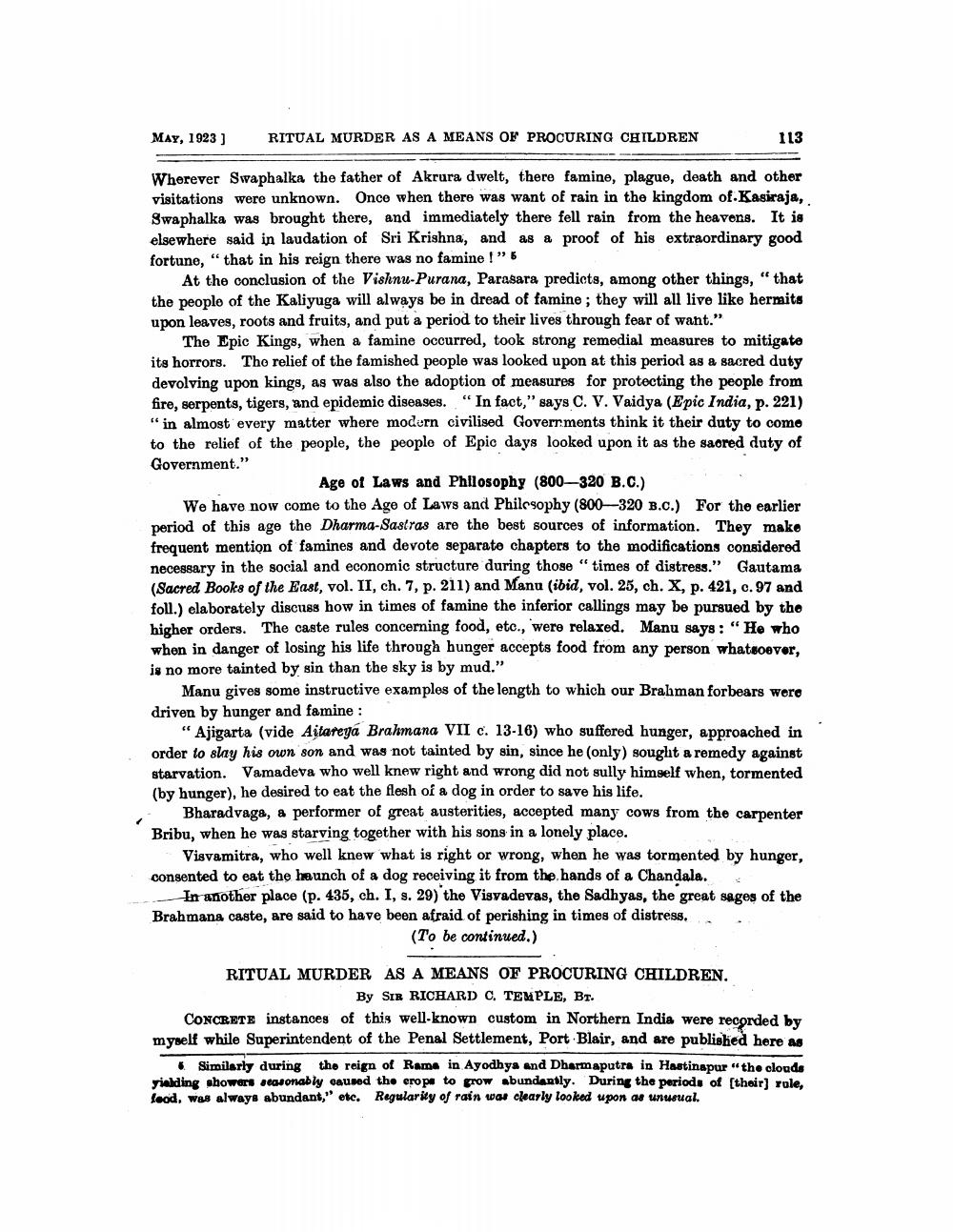________________
MAY, 1923)
RITUAL MURDER AS A MEANS OF PROCURING CHILDREN
113
Wherever Swaphalka the father of Akrura dwelt, there famine, plague, death and other visitations were unknown. Once when there was want of rain in the kingdom of Kasiraja, Swaphalka was brought there, and immediately there fell rain from the heavens. It is elsewhere said in laudation of Sri Krishna, and as a proof of his extraordinary good fortune," that in his reign there was no famine ! ” 5
At the conclusion of the Vishnu-Purana, Parasara predicts, among other things," that the people of the Kaliyuga will always be in dread of famine; they will all live like hermits upon leaves, roots and fruits, and put a period to their lives through fear of want."
The Epic Kings, when a famine occurred, took strong remedial measures to mitigate its horrors. The relief of the famished people was looked upon at this period as a sacred duty devolving upon kings, as was also the adoption of measures for protecting the people from fire, serpents, tigers, and epidemic diseases. "In fact," says C. V. Vaidya (Epic India, p. 221) "in almost every matter where modern civilised Goverr.ments think it their duty to como to the relief of the people, the people of Epic days looked upon it as the sacred duty of Government."
Age of Laws and Philosophy (800—320 B.C.) We have now come to the Age of Laws and Philosophy (800-320 B.C.) For the earlier period of this age the Dharma-Sastras are the best sources of information. They make frequent mention of famines and devote separate chapters to the modifications considered necessary in the social and economic structure during those "times of distress." Gautama (Sacred Books of the East, vol. II, ch. 7, p. 211) and Manu (ibid, vol. 25, ch. X, p. 421, 0.97 and foll.) elaborately discuss how in times of famine the inferior callings may be pursued by the higher orders. The caste rules concerning food, etc., were relaxed. Manu says: "He who when in danger of losing his life through hunger accepts food from any person whatsoever, is no more tainted by sin than the sky is by mud."
Manu gives some instructive examples of the length to which our Brahman forbears woro driven by hunger and famine:
“Ajigarta (vide Aitareya Brahmana VII c. 13-16) who suffered hunger, approached in order to slay his own son and was not tainted by sin, since he (only) sought a remedy against starvation. Vamadeva who well knew right and wrong did not sully himself when, tormented (by hunger), he desired to eat the flesh of a dog in order to save his life.
Bharadvaga, a performer of great austerities, accepted many cows from the carpenter Bribu, when he was starving together with his sons in a lonely place.
Visvamitra, who well knew what is right or wrong, when he was tormented by hunger, consented to eat the haunch of a dog receiving it from the hands of a Chandala.
In another place (p. 435, ch. I, s. 29) the Visvadevas, the Sadhyas, the great sages of the Brahmana caste, are said to have been afraid of perishing in times of distress.
(To be continued.)
RITUAL MURDER AS A MEANS OF PROCURING CHILDREN.
By SIR RICHARD C. TEMPLE, BT. CONCRETE instances of this well-known custom in Northern India were recorded by myself while Superintendent of the Penal Settlement, Port Blair, and are published here as
Similarly during the reign of Rama in Ayodhya and Dharmaputra in Hastinapur "the clouds rialding showers soonably caused the erope to grow abundantly. During the periods of [their] role, lood, was always abundant," etc. Regularity of rain was clearly looked upon as unusual.




